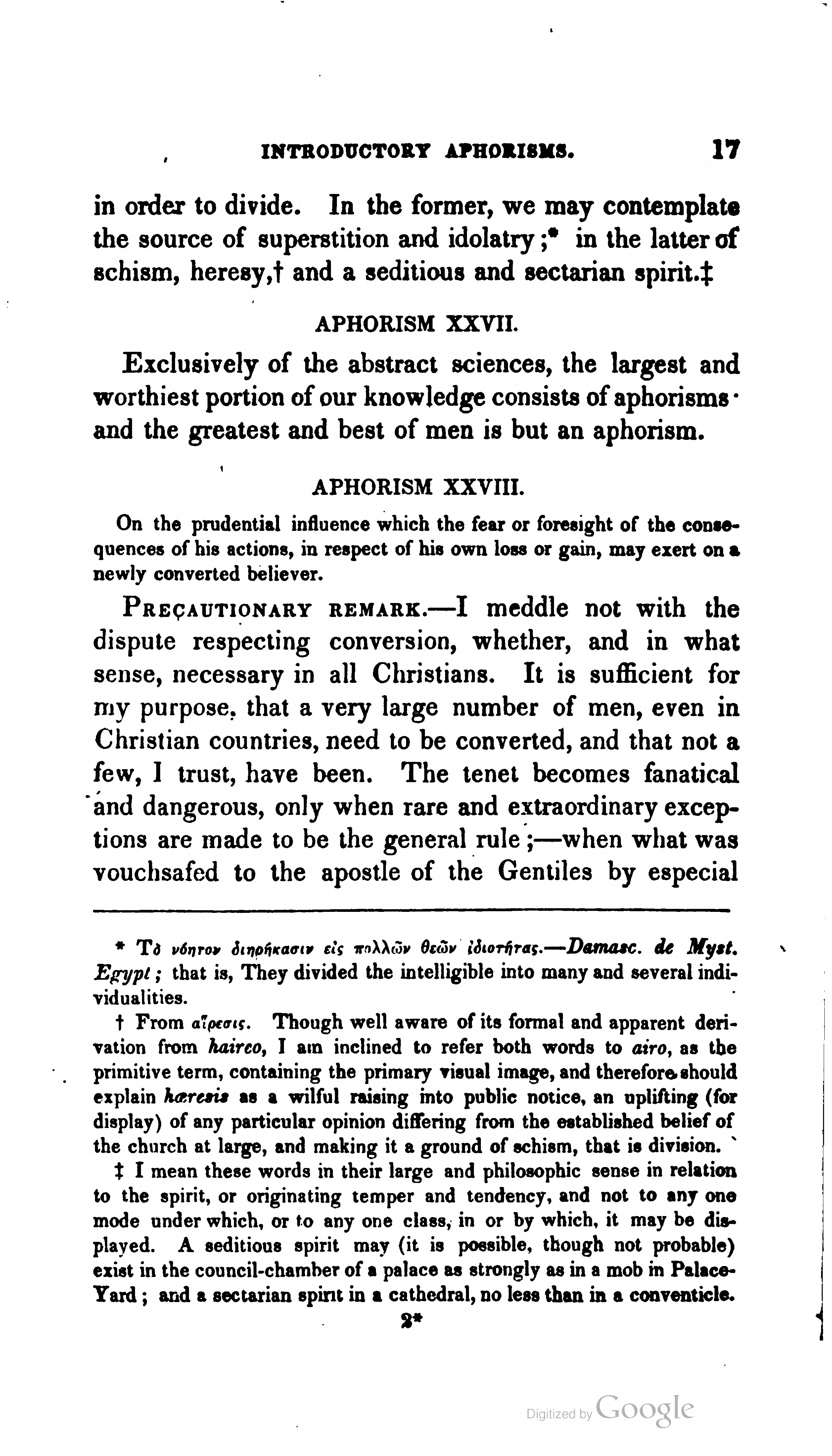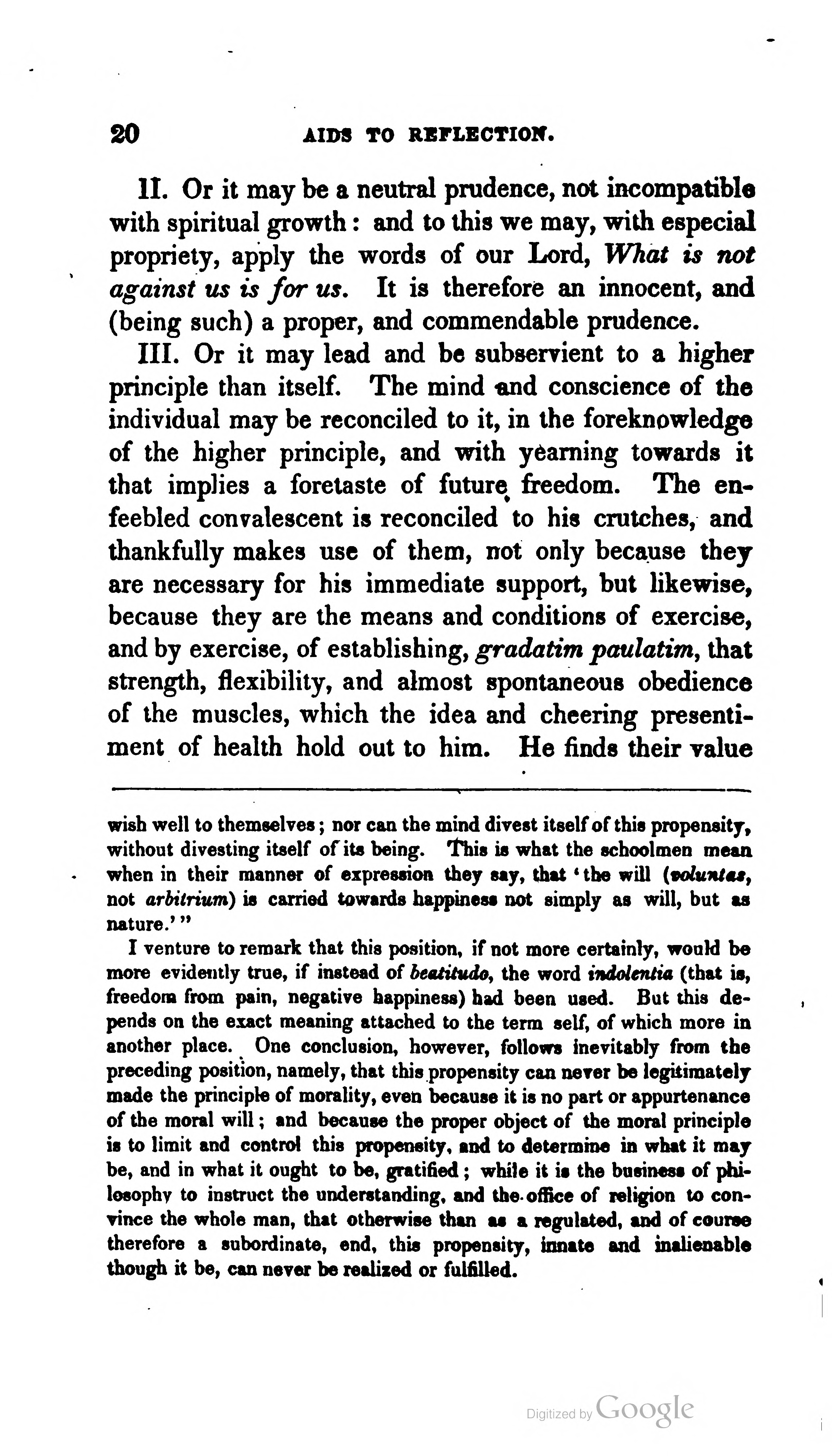Contents
| « Prev | APHORISM XXIX. | Next » |
APHORISM XXIX.
Awakened by the cock-crow (a sermon, a calamity, a sick bed, or a providential escape) the Christian pilgrim sets out in the morning twilight, while yet the truth (the

is below the horizon. Certain necessary consequences of his past life and his present undertaking will be seen by the refraction of its light: more will be apprehended and conjectured. The phantasms, that had predominated during the hours of darkness, are still busy. Though they no longer present themselves as distinct forms, they yet remain as formative motions in the pilgrim's soul, unconscious of its own activity and over-mastered by its own workmanship.
[^*] Whereas Christ's other disciples had a breeding under him, St. Paul was born an apostle; not carved out, as the rest, by degrees and in course of time, but a fusile apostle, an apostle poured out and cast in a mould. As Adam was a perfect man in an instant, so was St. Paul a perfect Christian. The same spirit was the lightning that melted, and the mould that received, and shaped him.--Donne's Sermons--quoted from memory.
[^†] From the Latin, convertere, that is, by an act of the will to turn towards the true pole, at the same time (for this is the force of the prepositive con,) that the understanding is convinced and made aware of its existence and direction. 19 Things take the signature of thought. The shapes of the recent dream become a mould for the objects in the distance, and these again give an outwardness and sensation of reality to the shapings of the dream. The bodings inspired by the long habit of selfishness, and self-seeking cunning, though they are now commencing the process of their purification into that fear which is the beginning of wisdom, and which, as such, is ordained to be our guide and safeguard, till the sun of love, the perfect law of liberty, is fully arisen--these bodings will set the fancy at work, and haply, for a time, transform the mists of dim and imperfect knowledge into determinate superstitions. But in either case, whether seen clearly or dimly, whether beholden or only imagined, the consequences contemplated in their bearings on the individual's inherent[^*] desire of happiness and dread of pain become motives; and (unless all distinction in the words be done away with, and either prudence or virtue be reduced to a superfluous synonyme, a redundancy in all the languages of the civilized world) these motives, and the acts and forbearances directly proceeding from them, fall under the head of prudence, as belonging to one or other of its three very distinct species.
I. It may be a prudence, that stands in opposition to a higher moral life, and tends to preclude it, and to prevent the soul from ever arriving at the hatred of sin for its own exceeding sinfulness (Rom. vii, 13): and this is an evil prudence.
[^*]The following extract from Leighton's Theological Lectures, sect. II, may serve as a comment on this sentence:
"The human mind, however shunned and weakened by the Fall, still retains some faint idea of the good it has lost; a kind of languid sense of its misery and indigence, with affections suitable to these obscure notions. This at least is beyond all doubt and indisputable, that all men
20II. Or it may be a neutral prudence, not incompatible with spiritual growth: and to this we may, with especial propriety, apply the words of our Lord, What is not against us is for us. It is therefore an innocent, and (being such) a proper, and commendable prudence.
III. Or it may lead and be subservient to a higher principle than itself. The mind and conscience of the individual may be reconciled to it, in the foreknowledge of the higher principle, and with yearning towards it that implies a foretaste of future freedom. The enfeebled convalescent is reconciled to his crutches, and thankfully makes use of them, not only because they are necessary for his immediate support, but likewise, because they are the means and conditions of exercise, and by exercise, of establishing, gradatim paulatim, that strength, flexibility, and almost spontaneous obedience of the muscles, which the idea and cheering presentiment of health hold out to him. He finds their value
wish well to themselves; nor can the mind divest itself of this propensity, without divesting itself of its being. This is what the schoolmen mean when in their manner of expression they say, that 'the will (voluntas, not arbitrium) is carried towards happiness not simply as will, but as nature.'"
I venture to remark that this position, if not more certainly, would be more evidently true, if instead of beatitude, the word indolentia (that is, freedom from pain, negative happiness) had been used. But this depends on the exact meaning attached to the term self, of which more in another place. One conclusion, however, follows inevitably from the preceding position, namely, that this propensity can never be legitimately made the principle of morality, even because it is no part or appurtenance of the moral will; and because the proper object of the moral principle is to limit and control this propensity, and to determine in what it may be, and in what it ought to be, gratified; while it is the business of philosophy to instruct the understanding, and the office of religion to convince the whole man, that otherwise than as a regulated, and of course therefore a subordinate, end, this propensity, innate and inalienable though it be, can never be realized or fulfilled. 21 in their present necessity, and their worth as they are the instruments of finally superseding it. This is a faithful, a wise prudence, having, indeed, its birth-place in the world, and the wisdom of this world for its father; but naturalized in a better land, and having the wisdom from above for its sponsor and spiritual parent. To steal a dropt feather from the spicy nest of the phoenix, (the fond humour, I mean, of the mystic divines and allegorizers of holy writ), it is the son of Terah from Ur of the Chaldees, who gives a tithe of all to the King of Righteousness, without father, without mother, without descent,(

IV. Lastly, there is a prudence that co-exists with morality, as morality co-exists with the spiritual life: a prudence that is the organ of both, as the understanding is to the reason and the will, or as the lungs are to the heart and brain. This is a holy prudence, the steward faithful and discreet (

Let not then, I entreat you, my purpose be misunderstood; as if, in distinguishing virtue from prudence, I wished to divide the one from the other. True morality is hostile to that prudence only, which is preclusive of true morality. The teacher, who subordinates prudence to virtue, cannot be supposed to dispense with virtue; and he, who teaches the proper connexion of the one with the other, does not depreciate the lower in any sense; while by making it a link of the same chain with the higher, and receiving the same influence, he raises it.
In general, morality may be compared to the consonant; prudence to the vowel. The former cannot be uttered (reduced to practice) but by means of the latter.
22| « Prev | APHORISM XXIX. | Next » |